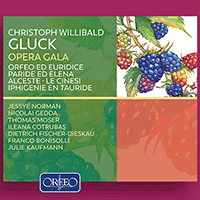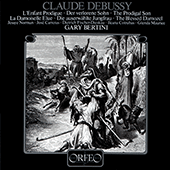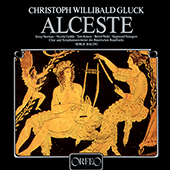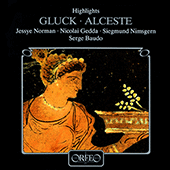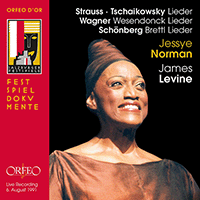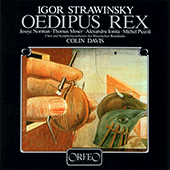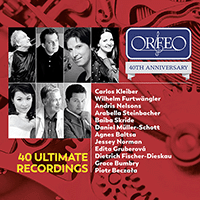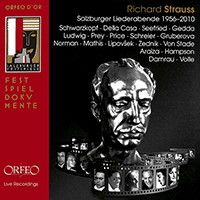Jessye Norman
Jessye Norman’s immediate family was extremely musical: her mother (a schoolteacher) and her grandmother were both pianists and her father (an insurance salesman) sang in a local choir. Her mother ensured that she had piano lessons from an early age, when she also demonstrated vocal talent, singing gospel songs in church. At the age of nine she heard opera for the first time on the radio and became an enthusiast, listening to recordings by Marian Anderson and Leontyne Price.
At sixteen Norman entered the Marian Anderson Vocal Competition in Philadelphia and as a result was offered a scholarship at Howard University, Washington DC, where she studied with Carolyn Grant, singing in the university chorus and as a soloist in church. In 1966 she won the National Society of Arts and Letters Singing Competition and in 1967 entered postgraduate study, first at Peabody Conservatory, Baltimore and then at the University of Michigan at Ann Arbor, working with Elizabeth Mannion and Pierre Bernac, and gaining her master’s degree in 1968.
In order to progress her career, Norman then moved to Europe. In 1969 she won the ARD International Music Competition in Munich, securing a three-year contract with the Deutsche Oper, Berlin and making her debut there the same year as Elisabeth / Tannhäuser, followed by the title role in Aida, the Countess / Le nozze di Figaro and Elsa / Lohengrin.
Norman appeared in Florence in Handel’s Dinorah in 1970 and returned to sing Selika / L’Africaine at the Maggio Musicale in 1971, the year in which she recorded the Countess for Philips with Colin Davis conducting. In 1972 she made her debuts both at La Scala, Milan as Aida and at the Royal Opera House, London as Cassandra / Les Troyens, returning as Elisabeth in 1973. Her first professional American appearance was as Aida at the Hollywood Bowl in 1972, followed by a Wagner concert at the Tanglewood Festival and a recital tour. In 1975 Norman moved to London and made no operatic appearances for five years, concentrating instead on recitals and concerts, often singing music by Schubert, Brahms, Wagner, Mahler, Satie and Messiaen as well as contemporary composers. She returned to the operatic stage in 1980 in the title role of Richard Strauss’s Ariadne auf Naxos at the Hamburg State Opera.
It was in 1982 that Norman made her US operatic debut, with the Philadelphia Opera Company as Jocasta / Oedipus Rex and Dido / Dido and Aeneas. The following year she first appeared at the Metropolitan Opera, New York as both Cassandra and Dido / Les Troyens, returning to sing Jocasta in 1984 and Ariadne in 1985. Later roles at the Met included Elisabeth and Madame Lidoine / Dialogues des Carmélites (both 1987); Judith / Bluebeard’s Castle, The Woman / Erwartung and Sieglinde / Die Walküre (all 1989); Kundry / Parsifal (1991) and Emilia Marty / The Makropulos Case (1996).
At the Salzburg Festival in 1987 Norman collaborated with Herbert von Karajan in one of his last appearances, singing the ‘Liebestod’ from Tristan und Isolde with the Vienna Philharmonic Orchestra. Other major works in her concert repertoire included Strauss’s Vier letzte Lieder and Schoenberg’s Gurrelieder; and in 1989 she sang La Marseillaise at the two-hundredth anniversary celebrations of the French Revolution in Paris.
Although Norman made her debut with the Chicago Lyric Opera in 1990 in the title role of Gluck’s Alceste. During the 1990s she settled in New York and gradually moved away from soprano stage roles to parts written for the mezzo-soprano voice, such as in Mahler’s Das Lied von der Erde. She also began to sing jazz, not only in concert but in multi-media collaborations, for instance with choreographers Bill T. Jones (New York, 1999) and Trey McIntyre (Vail, 2006). She has sung a considerable amount of contemporary music, including a song-cycle by Judith Weir entitled woman.life.song commissioned for her by Carnegie Hall; and has performed songs by Mussorgsky in Russian in Moscow.
Her voice at its peak moved effortlessly throughout the mezzo-soprano and soprano ranges, and possessed a rich, full tone that was thrilling to hear. On stage Norman used her statuesque presence to great effect, often dominating the dramatic proceedings. In her independence of thought and action and her musical versatility, she continues to be one of the great American singers of her generation.
© Naxos Rights International Ltd. — David Patmore (A–Z of Singers, Naxos 8.558097-100).








